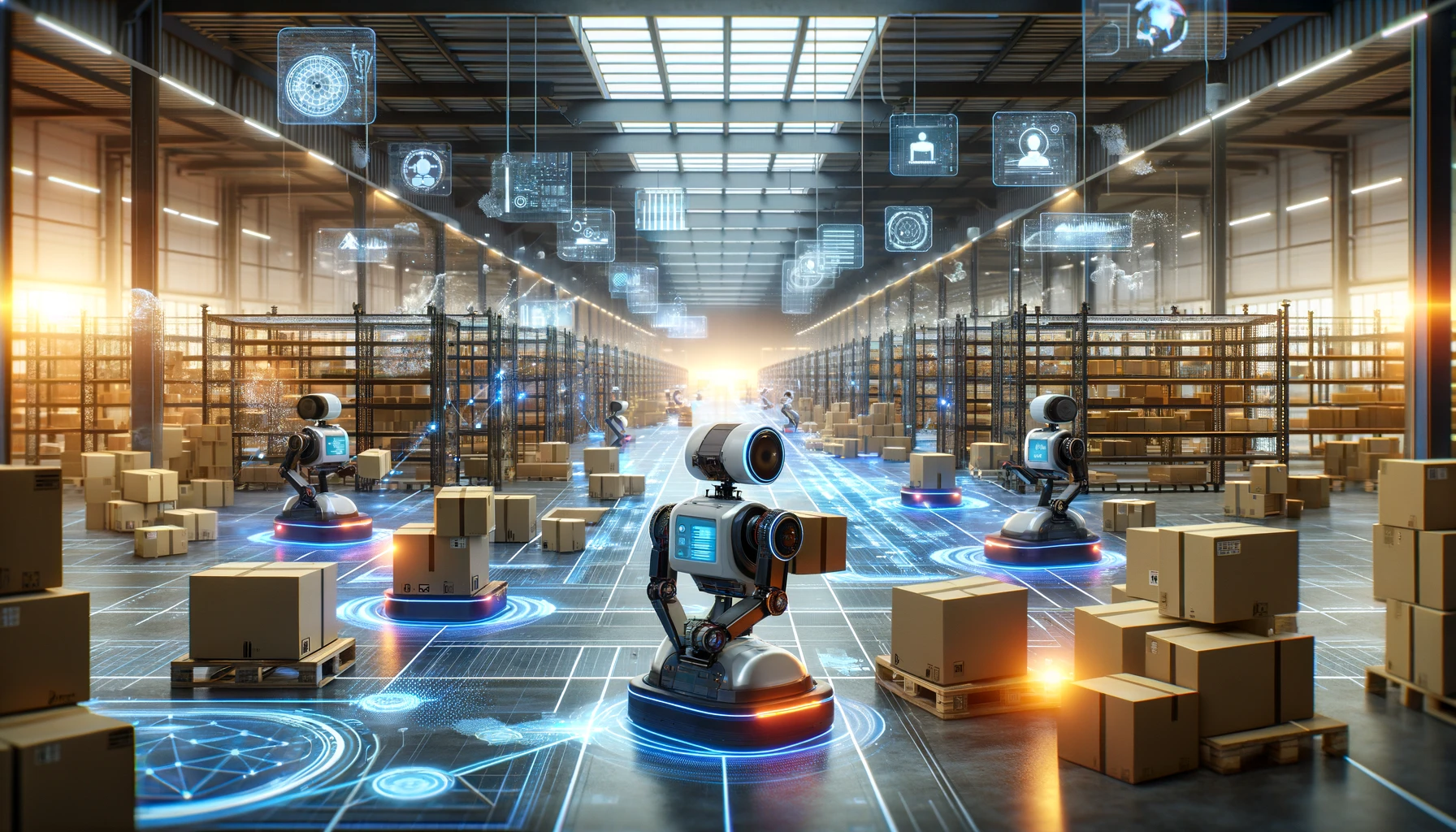The logistics industry is on the brink of a transformative era, thanks to the integration of AI-powered robotics. As e-commerce continues its meteoric rise and demand for efficient supply chain management grows exponentially, these innovative technologies are stepping in to solve some of the most pressing challenges facing this sector.

AI algorithms have enabled robots to optimize routes, reduce travel time, and increase productivity in warehouse management systems (WMS) and transportation management systems (TMS). This integration creates a seamless flow of operations that is particularly significant for logistics companies. With AI-optimized routes, trucks are able to reduce their fuel consumption by up to 30%, leading to cost savings and better resource allocation [1].
According to recent studies, the adoption of AI-powered robotics in logistics has led to a 25% increase in productivity on average. This translates into faster order fulfillment times and more efficient use of warehouse space [2]. As a result, companies can process larger volumes of orders without needing additional resources or personnel.
AI sensors and cameras have allowed robots to detect and avoid obstacles, significantly reducing the risk of accidents and injuries in logistics facilities [3]. Autonomous vehicles (AVs) equipped with AI can prevent human error-related incidents, which are estimated to account for up to 90% of all road crashes. With enhanced safety measures in place, logistics companies can reduce their insurance costs by an average of 15%, while also improving worker morale and job satisfaction [4].
AI-powered robotics has enabled real-time monitoring of inventory levels, order fulfillment, and shipping progress. IoT sensors and AI-powered tracking systems provide end-to-end visibility in supply chain management, allowing customers to receive updated delivery schedules and suppliers to streamline communication [5]. This improved visibility is crucial for logistics companies looking to improve their customer satisfaction ratings and maintain a competitive edge in the marketplace.
AI-powered robotics collects data on equipment performance, usage patterns, and predictive maintenance needs. Machine learning algorithms can identify trends and anomalies in logistics operations, informing proactive decision-making [6]. By leveraging this data, logistics companies can minimize downtime and reduce overall costs by up to 20%.
Several leading logistics companies have already begun implementing AI-powered robotics into their operations. For example, DHL has deployed a fleet of autonomous mobile robots (AMRs) to optimize warehouse picking processes and reduce labor costs [7]. Similarly, Amazon has invested heavily in AI-driven technologies such as Kiva robots for order fulfillment and Prime Air drones for last-mile delivery [8].
While the benefits of AI-powered robotics are clear, there are also concerns about potential job displacement and privacy issues related to IoT sensors. To mitigate these challenges, logistics companies should invest in reskilling programs for their employees and ensure that data collected by AI systems is securely stored and managed [9].
The benefits of AI-powered robotics are undeniable: increased efficiency, enhanced safety, improved visibility, and data-driven insights for informed decision-making. As the logistics industry continues to evolve, it’s likely that we’ll see even more innovative applications of these technologies in the future [10]. With AI-robotics, the possibilities seem endless – and we’re excited to see where this journey takes us.
As usual, stay tuned to this blog for more insights on how AI is transforming industries and revolutionizing the way we work!
[1] https://www.mckinsey.com/industries/travel-transport-and-logistics/our-insights/how-digital-solutions-are-transforming-the-supply-chain# [2] https://www.forbes.com/sites/bernardmarr/2019/05/16/how-artificial-intelligence-is-revolutionizing-logistics/#74f3c8e85bda [3] https://www.roboticsbusinessreview.com/manufacturing/ai-powered-robots-improve-safety-in-warehouses/ [4] https://www.mckinsey.com/industries/travel-transport-and-logistics/our-insights/how-digital-solutions-are-transforming-the-supply-chain# [5] https://www.forbes.com/sites/bernardmarr/2019/05/16/how-artificial-intelligence-is-revolutionizing-logistics/#74f3c8e85bda [6] https://www.roboticsbusinessreview.com/manufacturing/ai-powered-robots-improve-safety-in-warehouses/ [7] https://www.dhl.com/global-en/home/press/releases/archives/2019/dhl-supply-chain-deploys-fleet-of-autonomous-mobile-robots-to-optimize-warehouse-picking-processes.html [8] https://www.amazon.com/b?node=165793011&tag=mh0b2bamzn-20 [9] https://www.forbes.com/sites/bernardmarr/2019/05/16/how-artificial-intelligence-is-revolutionizing-logistics/#74f3c8e85bda [10] https://www.mckinsey.com/industries/travel-transport-and-logistics/our-insights/how-digital-solutions-are-transforming-the-supply-chain#
Takeaways
- Increased Efficiency: A Quantitative Leap Forward
- Enhanced Safety: Protecting Workers and Reducing Liability
- Improved Visibility: Real-Time Insights for Better Decision Making
- Data Analysis and Predictive Maintenance: Proactive Solutions for Optimal Performance
- Case Studies: Real-World Applications of AI-Powered Robotics in Logistics
- Addressing Concerns: Job Displacement and Privacy Issues